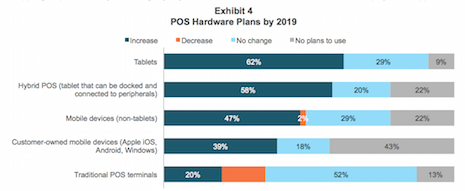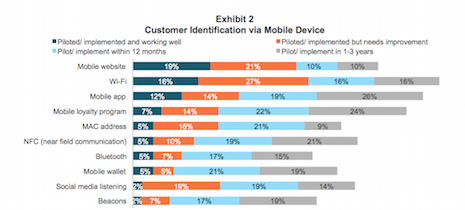 Mobile can help luxury retailers identify customers and personalize their experiences accordingly.
Mobile can help luxury retailers identify customers and personalize their experiences accordingly.
One of the top priorities for retailers this year will be identifying customers and delivering unique, personalized experiences based on that identification, according to a new report from Boston Retail Partners. BRP's "The Mobile World of Retail" report stresses the importance of how the retail experience needs to be unique and personalized for each consumer, and how mobile devices can help. Offering personalized experiences is something that will especially benefit luxury brands who rely on offering their customers an experience suited specifically to them beyond a standard retail trip.
“Luxury retailers have been much more aggressive than other retailers in enabling their store level teams with mobile devices for engaging the customer,” said Perry Kramer, vice president and practice lead for BRP, Boston. “Some savvy luxury retailers have even supplied each store associate with their own mobile device.
"For the most part, these devices are focused on giving the sales associate the ability to e-mail the customer, (before and after the sale), schedule appointments, inform the customer of new products and, most importantly, providing access to real-time inventory so that they can stay at the customer’s side when they check on something or see if the product is in the backroom. This is the high-end experience that consumers are expecting.”
Mobile retail It’s no secret that mobile devices have had a profound impact not just on the retail world but on every aspect of our lives. Consumers are now connected to the Internet at all times, meaning that there are more opportunities for brands to reach them and to identify them. Discerning exactly how to use mobile to do so was the goal of BRP’s latest report, which surveyed retailers to find out what their priorities were for the future of mobile retail. Seventy percent of respondents said that the identification of customers and personalization of the retail experience for customers is their biggest priority. Retailers are adopting mobile POS systems
Personalizing the customer experience if retailers do not know who the customer is. That is where mobile comes in, with its capacity to tie a digital identity to a person, brands can understand more about the customer as they shop and tailor the experience to an individual.
This is particularly helpful for the luxury industry, where personalization and giving customers the best experience they can have is paramount. If customers are paying premium for a luxury brand, they expect the customer experience as a whole to be on the same level of the product they are purchasing.
BRP recommends using in-store location tools to guide customers around the store and help them search for and find information about products through their mobile devices while shopping.
Mobile point-of-sales, where sales associates can bring the cash register around the floor on a mobile device, as a way of opening up the retail experience to a more curated style as customers can be rung up anywhere in the store, are also suggested by BRP.
Personalization
Luxury brands around the world have already used mobile as a tool for personalizing the customer experience.
For example, Preferred Hotel and Resorts created their own mobile application specifically to do this for the travel industry.
The app puts the company’s digital loyalty program, iPrefer, into a simple mobile package. This development was a response to a growing desire among travelers to manage both their loyalty programs and travel information through their mobile devices (see story).
Jeweler John Hardy also partnered with a mobile app to give consumers direct contact with sales associates in store as well as browsing products on their device while they shop.
Retailers are adopting mobile POS systems
Personalizing the customer experience if retailers do not know who the customer is. That is where mobile comes in, with its capacity to tie a digital identity to a person, brands can understand more about the customer as they shop and tailor the experience to an individual.
This is particularly helpful for the luxury industry, where personalization and giving customers the best experience they can have is paramount. If customers are paying premium for a luxury brand, they expect the customer experience as a whole to be on the same level of the product they are purchasing.
BRP recommends using in-store location tools to guide customers around the store and help them search for and find information about products through their mobile devices while shopping.
Mobile point-of-sales, where sales associates can bring the cash register around the floor on a mobile device, as a way of opening up the retail experience to a more curated style as customers can be rung up anywhere in the store, are also suggested by BRP.
Personalization
Luxury brands around the world have already used mobile as a tool for personalizing the customer experience.
For example, Preferred Hotel and Resorts created their own mobile application specifically to do this for the travel industry.
The app puts the company’s digital loyalty program, iPrefer, into a simple mobile package. This development was a response to a growing desire among travelers to manage both their loyalty programs and travel information through their mobile devices (see story).
Jeweler John Hardy also partnered with a mobile app to give consumers direct contact with sales associates in store as well as browsing products on their device while they shop.
 Mobile can help identify customers
John Hardy entered a partnership with ecommerce mobile application Hero, which allows online shoppers to connect with sales associates who are physically at the store with a combination of messaging, augmented reality and video (see story).
Ultimately, luxury brands need to understand that mobile integration of the physical retail location can be an excellent way to tie together different threads of the shopping experience and give customers a more unified and personalized experience.
Mobile can help identify customers
John Hardy entered a partnership with ecommerce mobile application Hero, which allows online shoppers to connect with sales associates who are physically at the store with a combination of messaging, augmented reality and video (see story).
Ultimately, luxury brands need to understand that mobile integration of the physical retail location can be an excellent way to tie together different threads of the shopping experience and give customers a more unified and personalized experience.
“The key to making mobile a larger part of the luxury retail brand experience is dependent on three important imperatives: quality data, visibility and training,” Mr. Kramer said. “Access to quality data that is relevant and actionable is especially relevant in luxury retail.
"With access to data on what is in your consumer’s closet and their preferences enable sales associates to personalize the customer experience and influence purchase decisions. Visibility to enterprise inventory in real-time enables sales associates to sell items that aren’t in the store but are available in other stores or warehouses.
"Training store associates on how to use mobile tools and monitoring and reacting to usage is critical, however, many retailers fail to invest in training which results in lower adoption by sales associates. Lack of proper training can also result in poor customer experiences which will disappoint customers and negatively impact sales.”
